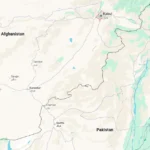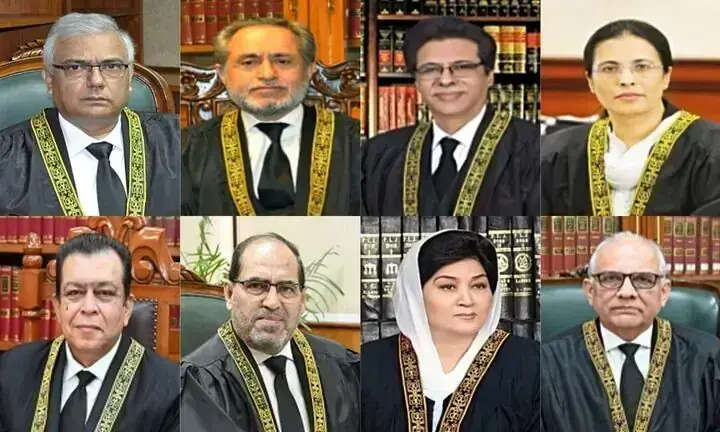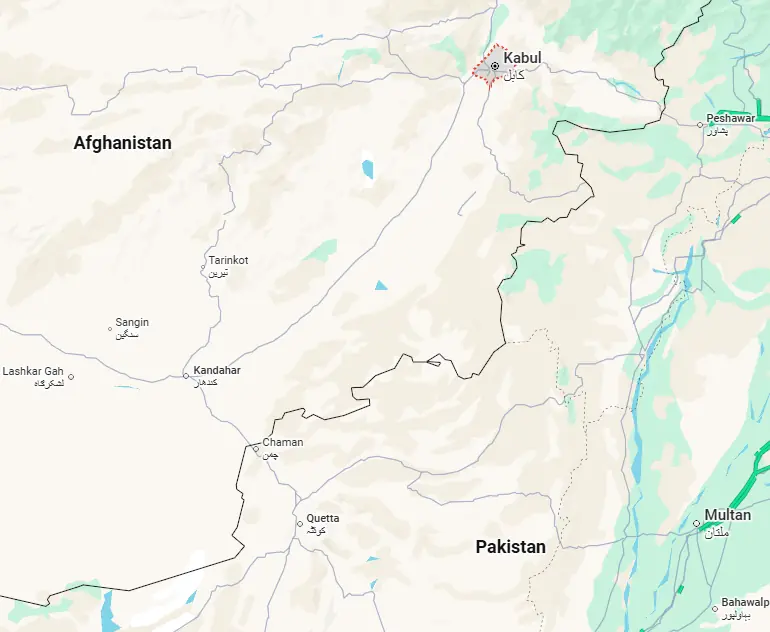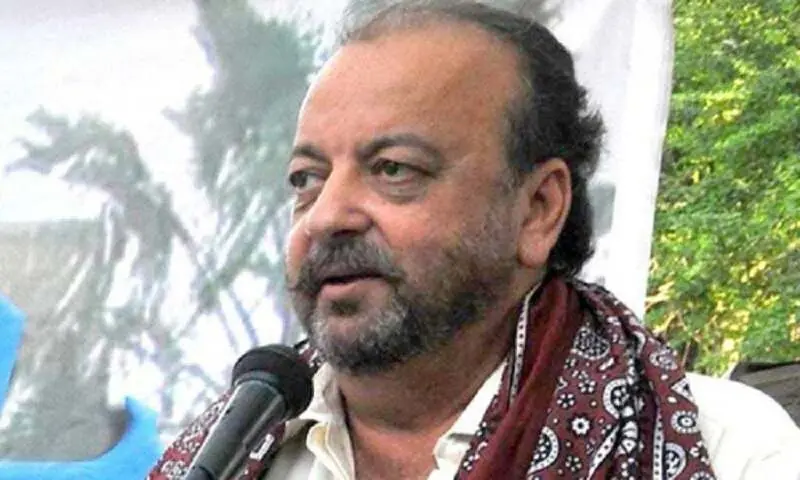Justice Jamal Khan Mandokhail on Monday wondered whether the judges comprising the Constitutional Bench (CB) of the Supreme Court (SC) who hear petitions against the 26th Amendment could do so if they were its “beneficiaries”.
The amendment was passed by parliament during a night session in October last year, and the PTI claimed that seven of its lawmakers were kidnapped to curry favor as the party opposed the legislation. The Balochistan National Party-Mengal (BNP-M) also alleged that its two senators were being pressured, and both subsequently defied the party line to vote in favor of the adjustments.
The legislation, which altered judicial authority and mandate, has been a focus of debate with opposition parties and legal experts questioning its impact on the independence of the judiciary.
The adjustments removed the suo motu powers of the SC, fixed the tenure of the Chief Justice of Pakistan (CJP) at three years and empowered a Special Parliamentary Committee for the appointment of the CJP from among the three most senior judges of the SC. It also paved the way for the formation of the CB, which is now hearing petitions against the very legislation that allowed its establishment.
Former President of the Supreme Court Bar Association (SCBA), Abid Shahid Zuberi, today continued his arguments on the case. The hearing was adjourned until 11:30 am tomorrow (Tuesday).
The CB hearing the pleas is headed by Justice Aminuddin Khan and also includes Justices Mandokhail, Muhammad Ali Mazhar, Ayesha Malik, Syed Hasan Azhar Rizvi, Musarrat Hilali, Naeem Akhtar Afghan and Shahid Bilal Hassan.
During recent hearings, judges have questioned whether the CB has the power to issue orders for the constitution of a full court, as requested by the petitioners.
So far, Lahore High Court Bar Association (LHCBA) advocate Hamid Khan, Balochistan High Court Bar Association (BHCBA) advocate Munir A. Malik and the petitioner Advocate Salahuddin Ahmed have submitted their arguments. Hamid sought the formation of a 16-member court based on the number of judges present in the SC in October 2024. Malik maintained that the CB had the power to issue a court order for the formation of a “full court”.
On Saturday, a convention jointly organized by the LHCBA and the Lahore Bar Association resolved to continue its fight against the 26th Constitutional Amendment, declaring that the legal fraternity will not accept any judicial verdict that undermines the independence of the judiciary.
The court will first determine whether the challenges should be heard by a full court consisting of all available SC judges or by the eight-judge CB itself, before deciding on the legality of the 26th Amendment.
The case was initially taken up in January and after the CB approved the petitioners’ application, the proceedings are being broadcast live on the SC’s YouTube channel since October 8.
the audience
At the beginning of the hearing, Justice Mandokhail questioned whether any party had the right to request a court of its choice, to which Zuberi responded: “I don’t think any party has the right to select a court of its choice. But the point here is that we are requesting a full court on some constitutional legal issues.”
The former SCBA president added that he had “always insisted that there should be a full bench.”
Justice Mandokhail then asked why Zuberi wanted a full court, to which the latter said he would cite previous rulings of judges ruling on the formation of a full court.
When the judge asked how many judges were currently appointed to the high court and what a full court would look like, Zuberi said there were a total of 24 judges. “I’m not declaring any judge wrong. All judges are honorable.”
Justice Ayesha then asked the petitioner what his request was, to which Zuberi said that the judges who were present before the 26th Amendment should hear the case. LHCBA lawyer Hamid and BHCBA lawyer Malik had also requested the same.
In response to a question from Justice Mandokhail about the reasoning behind his request, Zuberi argued that the 26th Amendment, under which the CB was formed, “itself had been challenged.”
Justice Mandokhail then wondered whether the CJP, who was elevated to his post after the passage of the impugned amendment, would be part of the court or not, to which Zuberi said the Chief Justice himself should decide that.
Justice Mandokhail noted: “The Chief Justice was appointed under the 26th Amendment. If the constitutional amendment had not been present, then Yahya Afridi would not have become Chief Justice, as specified at the time.
“May Allah grant long life to the Chief Justice, the senior puisne judge (Justice Mansoor Ali Shah) was destined to become Chief Justice but he could not.”
The 26th Amendment had scrapped the principle of seniority for the appointment of the CJP and had laid down the selection criteria for the post among the 3 senior judges of the SC.
Judge Mandokhail then asked himself: “If we are the beneficiaries [of the Amendment]So we can’t be on the bench? Justice Mazhar asked who would hear the case at that time.
Zuberi clarified that he had not called them “beneficiaries” of the legislation. Justice Mandokhail then commented: “So you are saying that eight judges would decide the case would be wrong. It will be the same whether we sit eight or a full bench,” the judge added.
“Do you think the eight judges will become biased after occupying the constitutional court at this time?” he asked, adding that who would decide the case if the amendment under which the CB was formed was challenged.
Zuberi stressed that a full court meant “the collective minds of everyone.” Justice Aminuddin commented that judges had to act according to the Constitution.
On this point, Justice Ayesha observed that Article 191A of the Constitution, under which constitutional chambers were formed in the SC, “does not address the question of a full court, but of chambers.”
Justice Mandokhail commented that a full court could also be called a tribunal, but Justice Ayesha pointed out otherwise.
Questioning the powers of the CB to form a full bench, Justice Mazhar pointed out that the CB was nominated by the Judicial Commission of Pakistan (JCP) and asked whether the bench could include judges who were not part of it.
Zuberi, echoing the arguments presented by LHCBA lawyer Malik, responded: “The constitutional court can issue an injunction. […] “The entire court is not a court.”
Justice Mandokhail said: “How can we pass a court order [for full court] If it is not our jurisdiction? We will say clearly that we have no competition.”
However, Justice Ayesha asked: “Are there any restrictions on passing a court order?”
At one point during the hearing, Judge Mandokhail asked Zuberi if he wanted the entire court matter to be sent to the senior puisne judge. The former SCBA president responded that the matter should be referred to the CJP first, and “if the chief justice abstains, then it should be referred to the senior puisne judge.”
Justice Mazhar questioned how the matter would be sent to the CJP as he was “not the head of the list”.
Zuberi argued: “If you don’t have the power, how have the full courts been formed until now?”
the requests
The 26th Amendment had been challenged by several bar associations, bar councils, lawyers, the PTI and some politicians. The SC is also receiving separate petitions seeking formation of a full bench to hear the matter, instead of the CB.
The petitioners have asked the high court to strike down the entire 26th Amendment on grounds of procedural irregularity if it is determined that the required two-thirds of the legally elected members of each House did not freely exercise their right to vote in favor of it as required by Article 239, which details bills and their passage to amend the Constitution.
Alternatively, the petitioners argued, the court should strike down certain provisions of the 26th Amendment because they substantially undermine the independence of the judiciary, which is a prominent feature of the Constitution.
These included provisions for the JCP to carry out annual performance reviews of High Court judges in section 175A(1) and sections 175A(18) to (20); the provisions relating to the appointment of the CJP are the replacement of Article 175A (3), and the provisions for the constitutional chambers of the TS and the high courts.
The petitioners also questioned the constitutionality of the constitutional courts, arguing that the SC should declare invalid all amendments for which the votes of such members whose electoral disputes were pending were necessary to reach the numerical threshold prescribed in Article 239.
They also called for the Practice and Procedure Act 2024 and the Supreme Court (Number of Judges) Act 2024 to be declared unconstitutional, void ab initio and of no legal effect as they arise from an “unconstitutional” amendment and represent an attempt to achieve unconstitutional designs.
More to follow









